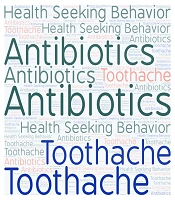Dear Editor,
Toothache is one of the most common oral health problems and has a significant impact on a person’s physical and mental well-being (1). Some people believe that antibiotics are always the right treatment for toothache and therefore use antibiotics to avoid dental procedures, often due to dentophobia or difficulties accessing emergency dental care (2). In a study, 68.8% of participants believed that antibiotics relieve toothache (3). Another study conducted on social media to examine people’s experiences and attitudes toward the use of antibiotics for toothache found that many had used antibiotics for this purpose and believed that antibiotics were a suitable and essential treatment (2). Additionally, studies have repeatedly reported patient pressure on dentists to prescribe antibiotics (4, 5). Dentists often encounter patients who have taken antibiotics arbitrarily, believing that pulp or periodontal infections will only improve with antibiotics. Results from Al-Khatib and AlMohammad’s study showed that about a third of the participating dentists reported being pressured by patients to prescribe unnecessary antibiotics more than once a week (5).
Antibiotics do not cure toothache and are only needed if an infection is present (2). Only a few clinical conditions, including oral infections with systemic signs such as fever, lymphadenopathy, and trismus, require antibiotic treatment. Due to the pathophysiology of pulp disease, antibiotics cannot reach the pulp and destroy the microbes because of the reduced blood supply in the root canals. Therefore, most cases of toothache caused by pulp infection require therapeutic intervention, and antibiotics should not replace such interventions aimed at eliminating the cause of the infection. In these cases, only dental procedures such as root canal therapy can relieve symptoms and eliminate the infection (6).
Guidelines for treating toothache and/or infection generally focus on eliminating the cause through a dental procedure such as tooth extraction (2). Overuse of antibiotics leads to increased bacterial resistance, which in turn results in higher mortality, longer hospital stays, and reduced protection from infections (6). Currently, 700,000 deaths per year worldwide are attributed to drug-resistant infections, and this number is estimated to increase to 10,000,000 by 2050 (7). The prevalence of unnecessary antibiotic use among patients underscores the importance of raising awareness about antibiotic misuse and implementing educational programs to inform patients of the risks associated with indiscriminate antibiotic use (5).
In a study examining the prevalence of self-prescribed antibiotics for dental problems and the influencing factors in the Iranian population, more than 65% of participants believed that antibiotic use had no side effects. Therefore, education about the potential side effects of antibiotics could be preventive. Additionally, amoxicillin was the most commonly used antibiotic, which increases the risk of future bacterial resistance to amoxicillin (8).
Difficulty in accessing emergency dental care, patient anxiety about dental treatment, high treatment costs, and the challenge of taking time off work are significant factors contributing to the substitution of dental treatment with antibiotics. Difficulties in accessing emergency dental care have previously been identified as a factor in prescribing antibiotics for acute toothache. The unprecedented restricted access to dental services during the COVID-19 pandemic has notably impacted antibiotic prescriptions, which increased by 25% in the UK (2).
Dentophobia is also linked to the avoidance of dental treatment (9), with its prevalence in adults reported to range from 4.2% to over 50% in various studies (10). Difficult access to dental care is cited as a major factor in the misuse of antibiotics. Improving access to dental services for patients with acute toothache and addressing issues such as dentophobia and financial barriers can significantly help reduce antibiotic misuse. Consequently, tooth pain should be treated through dental procedures, while antibiotic therapy should be reserved for serious infections (2).
A study found that uninsured patients were less likely to pressure their dentist into prescribing unnecessary antibiotics. These findings suggest that insurance companies might play a role in controlling unnecessary antibiotic use (5), and dental services should also be covered by insurance.
The widespread availability of antibiotics as over-the-counter medications in pharmacies is another factor contributing to the overuse of antibiotics for toothache (8). To combat antibiotic resistance driven by the misuse of antibiotics for toothache, controlling antibiotic consumption should be a priority (2).
